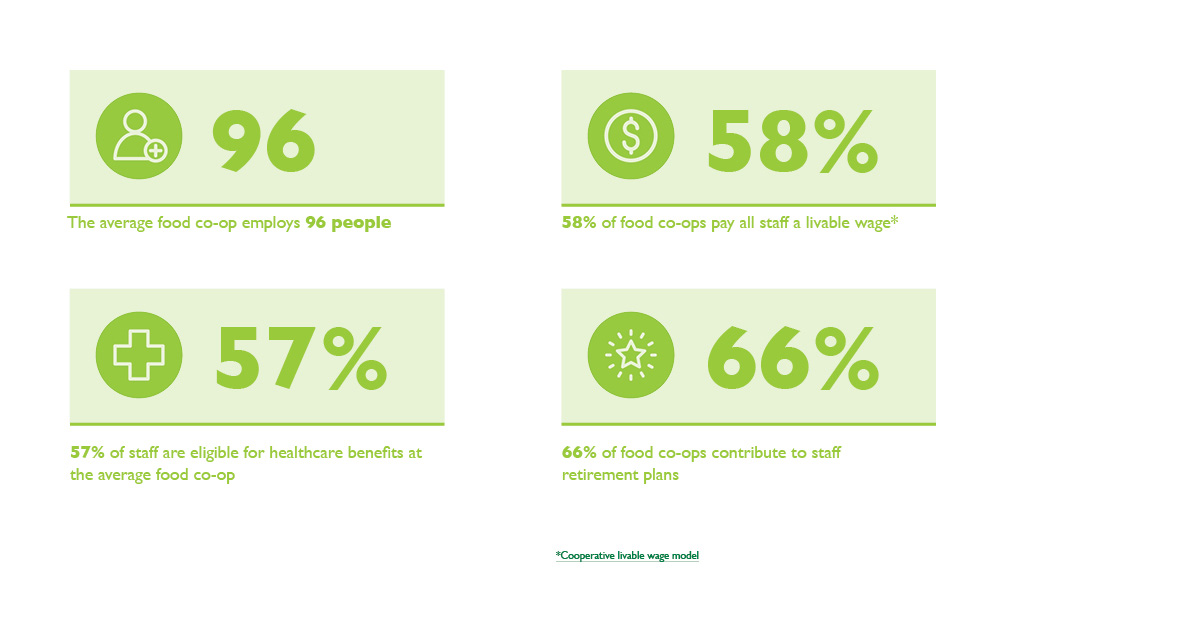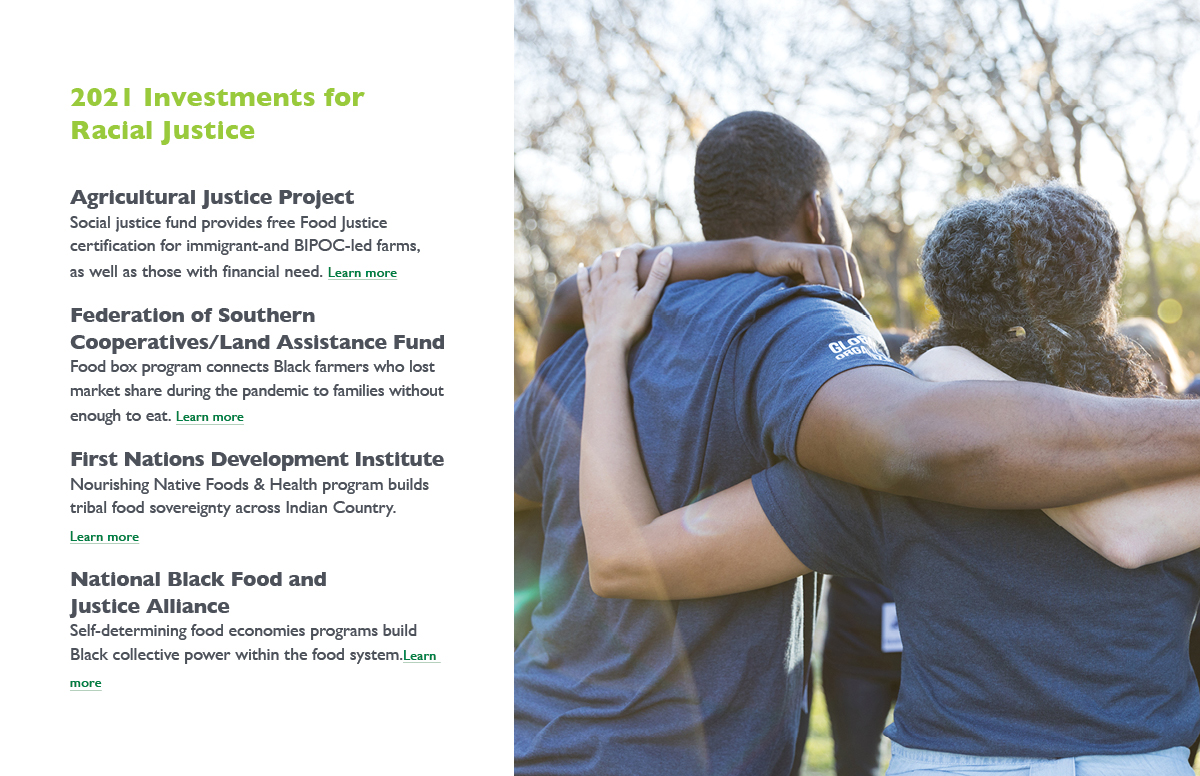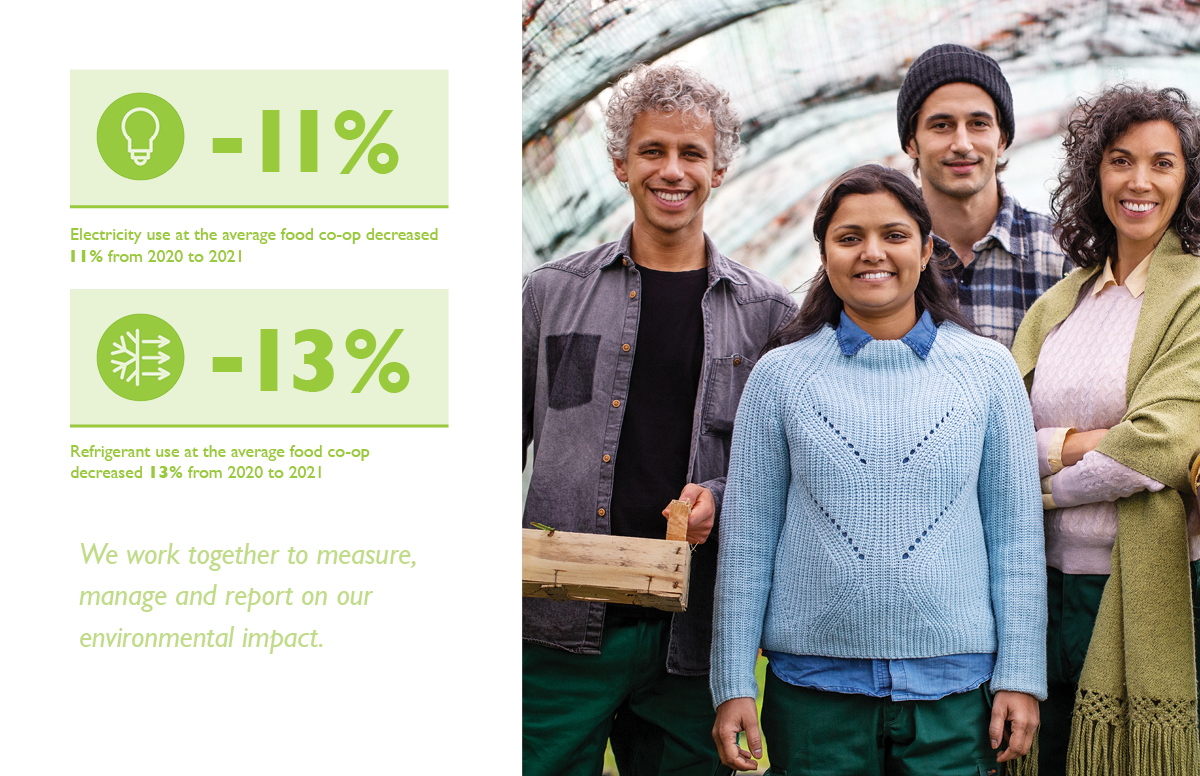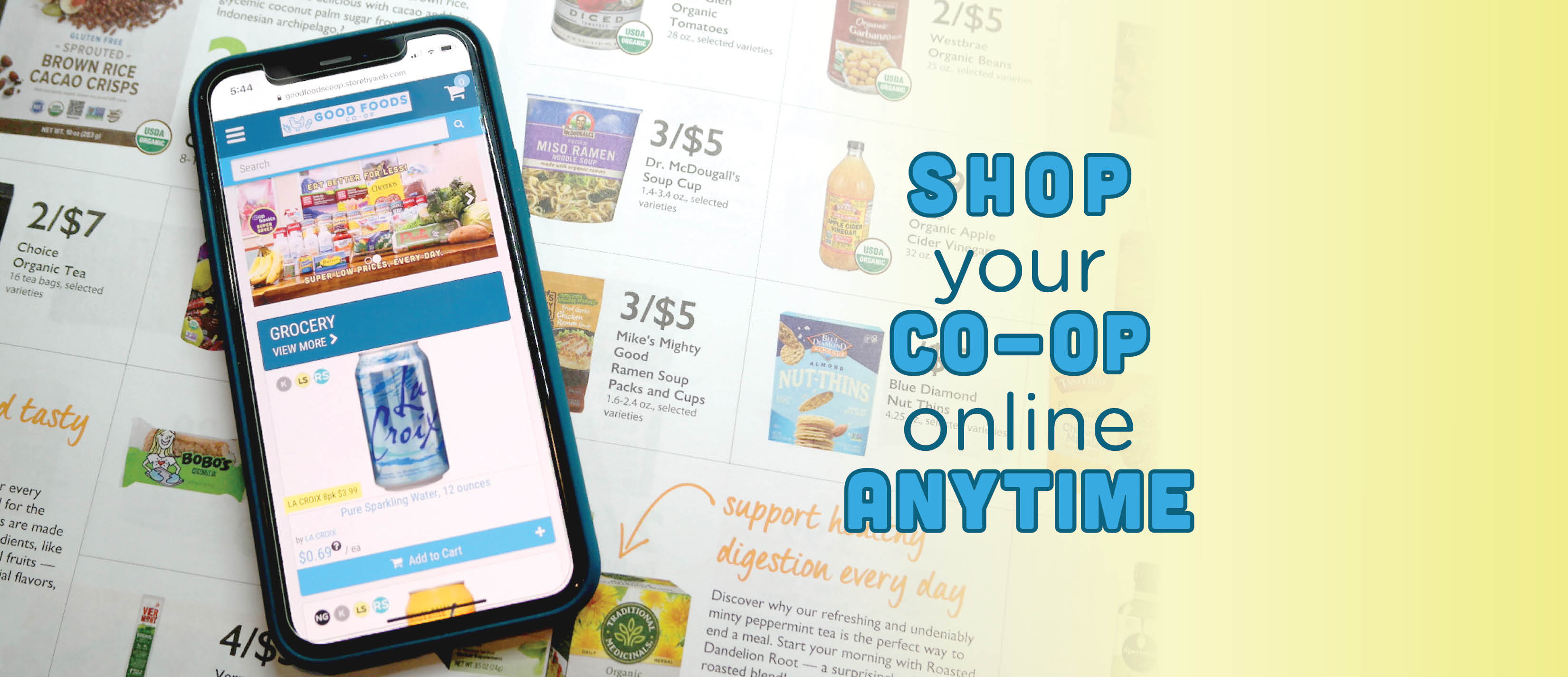
Together We Can Change Things
Food co-ops are community-owned grocery stores with the power to drive BIG change.
How big? We have a vision for our food system that prioritizes people’s wellbeing — from the fields to factories, cashiers to cooks and everyone in between. We are working towards the day when everyone can eat delicious, nutritious food produced and sold in ways that are good for people and restorative to the environment and our climate.
We have what it takes to dream big because food co-ops are grassroots organizations that are powered by democracy. Each food co-op can grow and change as community needs change, not when investors change their minds. Anyone, and everyone, is welcome to shop at the co-op, apply for a job and join as a member. Co-ops exist to serve their members and their community — this approach is our biggest strength.
Our annual impact report reflects the values and goals of the communities we serve, both as individual food co-ops and through our national cooperative, National Co+op Grocers (NCG). If you like what you see, consider joining a food co-op near you! If you’re already a member, thank you for strengthening your community.

Good Food Brings Us Together
Collectivism and cooperation have been practiced by indigenous societies since before recorded history, and modern co-ops enjoy a place in history and the Civil Rights movement as a proven tool to bring communities together to self-determine their own solutions to shared challenges. At food co-ops, we say “good food brings us together.”
Food is a cornerstone of community health and wellbeing, a necessity and pleasure that we all share. Every food co-op that exists today was organized by people who shared a desire to improve their community’s access to food, whether it was a need for fresh foods in their neighborhood, a desire to buy food grown without pesticides, a place for farmers to sell local products, all of the above and more.
Today, NCG represents 148 community-owned food co-ops like ours that have common goals. Collectively, we have 1.3 million members who believe we can build a strong, resilient and equitable food system together.

Three Cheers for Co-op Careers
Food co-op staff come from all walks of life but share a love of community. Our staff are empowered to go the extra mile to make your day, solve problems and have fun doing it because we’re all in this together.
Every worker deserves a livable wage, healthcare benefits and the sense of security that comes from building retirement savings. As independent businesses in a competitive industry, food co-ops are working to achieve these goals for our staff. We are making steady progress towards making it a reality — today 58% of food co-ops can pay all staff a livable wage* and we won’t stop until we reach 100%.
During the pandemic, food co-op staff have demonstrated courage, kindness, selflessness and tenacity. It’s their willingness to show up and contribute that makes our shared goal of a more equitable food system possible.

Groceries by the People, for the People
Everyone deserves the best food Earth can grow. In fact, this is why food co-ops organized to form NCG. Our national co-op helps our small, local, independent co-ops achieve pricing on organic and natural products that’s comparable to much larger chains, and makes it possible to pass additional savings on to shoppers with our Co+op Basics everyday low prices and Co+op Deals sales. That’s the power of people working together!
Even so, we know that promotions aren’t enough to make food affordable for our community members living in cycles of poverty and food insecurity. More than 40% of food co-ops offer a needs-based discount, and co-ops work together at the federal level to advocate for increased funding for nutrition programs like SNAP, WIC and fruit and vegetable incentive programs. In addition, food co-ops donate over a million pounds of nutritious food to local food pantries each year and raise money at the registers for these valuable community partners.
Recognizing that racism and poverty, and the federal policies that perpetuate them, are root causes of food insecurity, food co-ops also work through NCG to fund organizations working towards long-term systemic change.

Fresh Food from Farms Near You
The local folks who grow, produce, harvest, process and transport our food are also essential members of our communities, and food co-ops are proud to partner with them to build a strong, resilient local food system.
Food co-ops have cultivated relationships with local farmers and producers for decades, even when it wasn’t trendy, cost effective or convenient to do so. Locally grown and produced food increases our connection to each other and the land we all live on and builds a bridge between rural and city communities, which is needed now more than ever. Through NCG, food co-ops support federal policies to help small, regional farms and farmers thrive.
Food co-ops also work together to fund the National Farm to School Network, bringing the benefits of locally grown food into public schools in all 50 states and U.S. territories and expanding the market for local farmers and producers, as well.

Healing Racial Divides in Our Communities
Our country’s food system was built upon stolen land and depends on the labor of people of color earning low wages while working in vulnerable conditions. We recognize that racial equity is urgent and long overdue.
Currently, 95% of food co-ops are consensually and securely tracking demographic information for their staff, and 76% track demographics for their leadership, with a goal to reflect our communities at all levels. NCG offers education, training, discussion and support to empower food co-ops to make institutional changes towards full participation and shared power among diverse groups in our communities in determining mission, structure, policies and practices.
Through NCG, food co-ops invest in organizations led by people of the global majority working towards a more just and equitable food system, as well as racial equity initiatives by historically white-led organizations within the food system.

Products That Build an Inclusive Economy
Food co-ops have established an inclusive trade program to promote products from certified diverse-owned companies that are at least 51% owned by women, a person or people of color, LGBTQIA+ individuals, veterans and those who are differently abled. Now in its first year, we look forward to sharing this program’s impact in years to come.
We are proud to be the best place in town to find products that prioritize social and environmental benefits. Building an inclusive economy that works for everyone means changing business as usual — these labels can be found on products from companies doing just that!

Food Co-ops: The OGs of Organic
Food co-ops have a special place in our hearts for organic food. Many food co-op communities worked to get Congress to pass the original legislation that established a national organic certification program at the U.S. Department of Agriculture in 1990. Food co-ops continue to advocate for strong organic standards to this day.
USDA Organic Certification is the gold standard of food labels because it speaks to so many issues people care about today, including protection of our air, water and soil. Organic farming has been shown to sequester carbon from the atmosphere, slow global warming, and protect and foster biodiversity, including the essential pollinators we need to grow food. Organic certification does not permit the use of toxic, persistent chemicals that are detrimental to human, animal and environmental health, nor does it permit the use of bioengineering (GMOs). Organic also includes standards for animal welfare.
Through NCG, food co-ops are championing and supporting racial equity work within the organic industry.

One Planet, We Are All Connected
At food co-ops we believe that a healthy environment is a prerequisite for healthy people and a sustainable, resilient food system. We work together to measure, manage and report on our environmental impact. For grocers, it’s especially important that we find alternatives to traditional refrigeration methods that are particularly harmful to the atmosphere.
Each year, food co-ops offset the carbon emissions generated by business travel and office utilities for our national cooperative, NCG, by planting fast-growing tropical trees in South American rainforests. To date, we’ve planted and/or protected nearly 2 million trees in Peru, and in 2021, we began contributing to rainforest reforestation efforts in the Mato Grosso region of Brazil. This program helps us achieve long-term, verifiable carbon sequestration because we work in mutually beneficial relationships with farmers and scientists on the ground. Co+op Forest generates ecosystem benefits and income for the communities with whom we partner, while protecting the one world we all share.

